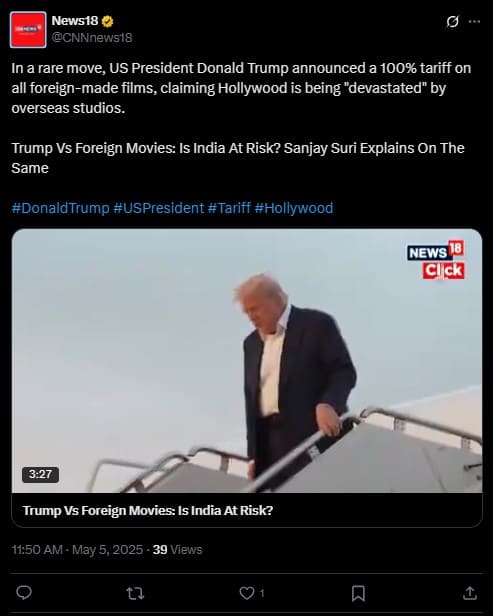In a surprising and controversial move, U.S. President Donald Trump has announced a 100% tariff on all foreign-made films, asserting that “Hollywood is being devastated by overseas studios.”
The statement, made during a press briefing on May 4, 2025, is part of Trump’s broader “America First” strategy—this time aimed squarely at the global film industry.
“The American movie industry is dying a very fast death,” said Trump, blaming international production houses for undercutting Hollywood with tax incentives and cheaper costs.
The tariff would apply to any film not produced on U.S. soil, regardless of the country of origin.
Why This Matters Globally
This policy could have wide-reaching effects:
- Foreign films may become twice as expensive to distribute or screen in the U.S., likely reducing their presence in American theaters and streaming services.
- Independent and art house films, many of which rely on niche American audiences, will suffer the most.
- U.S. platforms like Netflix and Amazon Prime, which acquire global content, might rethink licensing strategies.
Is Indian Cinema at Risk?
India, home to one of the world’s largest and most vibrant film industries, could be significantly affected.
Key Concerns for India:
- Loss of U.S. audience reach: Indian films, especially Hindi-language blockbusters and regional cinema, have a growing fanbase in North America.
- Impact on streaming deals: Platforms like Netflix, which invest in Indian originals, might reduce purchases of India-produced content.
- Cross-border projects: Collaborations or co-productions involving Indian studios and foreign entities may now face extra scrutiny or tariffs if filmed outside the U.S.
Sanjay Suri Weighs In
Sanjay Suri, Indian actor and producer known for championing independent and international cinema, has voiced concern over the announcement:
“Cinema is about storytelling beyond borders. A move like this doesn’t just isolate the U.S. industry—it damages global creative exchange.”
Suri, who has worked with filmmakers across the globe, emphasized that film is a medium of cultural diplomacy, and such trade barriers could lead to cultural insulation.
Industry Reactions
- Hollywood is divided—some welcome protectionist policies, others warn of creative stagnation.
- Film distributors in the U.S. are worried about reduced international content diversity.
- Foreign film festivals fear reduced American participation or screening opportunities.
Final Thoughts
While Trump frames this tariff as a move to “save Hollywood,” the reality may be more complex. Global cinema thrives on collaboration, and barriers like this risk turning the U.S. into a creative silo. For India and many other countries, this move is not just an economic blow—it’s a cultural setback.
The coming weeks will reveal whether this tariff holds, faces international challenge, or sparks retaliation from other nations.
